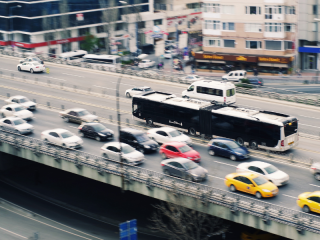
The Congestion Charge is a fee that you must pay if you drive through central London at certain times of the day. First introduced 20 years ago, the purpose of this scheme is to reduce traffic congestion and improve air quality in urban areas.
The Congestion Charge is only enforced in London, but its use has been considered in other major cities. It operates alongside the Ultra-Low Emission Zone (ULEZ); however, they are completely different schemes, so drivers may need to pay both fees.
What are congestion charges?
London is currently the only city in the UK which has a Congestion Charge. Drivers that enter this Congestion Charge zone must pay a daily fee.
£15 if you pay in advance or on the same day
£17.50 if you pay up to three days after you travel
Penalty Charge Notice (PCN) of £160 if unpaid, reduced to £80 if paid within 14 days, or increased to £240 after 28 days
The Congestion Charge was implemented to limit the number of vehicles in the centre of London. Although this scheme was initially controversial, the benefits are clear:
Traffic entering this zone during the weekday has decreased by 18%
Congestion has been reduced by 30%
Bus travel in central London has been boosted by 33%
10% of journeys have now switched to walking, cycling and public transport
By reducing traffic congestion and encouraging the use of public transport, air pollution is also limited which helps to protect the environment and local residents.
Learn more about the benefits of congestion charging.
Understanding the congestion charging zones
The Congestion Charge zone covers 1.3% of Greater London, stretching from Kings Cross, Vauxhall, Whitechapel, and Paddington. Key areas include:
Kings Cross
City Road
Old Street
Commercial Street
Tower Bridge Road
Elephant and Castle
Vauxhall
Park Lane
Edgware Road
Marylebone Road
Euston Road
Paddington
Whitechapel
City of London
West End
The Congestion Charge zones are clearly signposted with a large letter “C” in a red circle.
All roads around the perimeter of this zone are monitored by Automatic Number Plate Recognition (ANPR) cameras which read your number plate as you enter, drive around and leave the zone.
A check will then be conducted on your vehicle to ensure you’ve paid, and drivers that fail to pay within 3 days will receive a costly fine.
What time does the congestion charge apply?
This fee only applies:
Monday to Friday: 7am – 6pm
Saturday, Sunday & Bank Holidays: 12pm – 6pm
No charge: Outside of these hours and between Christmas Day and New Year’s Day bank holiday (inclusive)
If you're planning a trip, consider travelling outside these hours to avoid the charge.
How to pay congestion charges
Paying for the Congestion Charge is simple. You can either pay:
Online via the TfL website
On the phone at 0343 222 2222
At one of the blue and red self-service machines that are in car parks within this zone
Drivers that regularly travel through the Congestion Charge zone can use Auto Pay, which sets up automatic payments at a marginally discounted price. This can also be used to pay for any Low Emission Zone (LEZ) charges you may incur monthly too.
Can I check if I entered the zone?
Yes! You can check if your vehicle entered the Congestion Charge zone using tools like the Carwow Congestion Charge Checker. Simply enter your vehicle registration or postcode.
Exemptions and discounts
There are Congestion Charge exemptions and discounts available for some drivers and vehicles which you can apply for online. Residents living in London’s Congestion Charge zone receive a 90% discount, and the following qualify for a 100% exemption:
Blue badge holders, even if you don’t own a vehicle or drive
Vehicles with nine or more seats
Motorcycle riders (No need to register for exemption)
Breakdown and recovery vehicles
EV and hydrogen vehicles (Note: EVs will lose exemption from January 2026)
To receive the Congestion Charge discount, you must pay a £10 registration fee, and this will need to be renewed every year.
Use the TfL vehicle checker to see if your car qualifies.
Tips for navigating congestion charging
For some drivers, entering the London Congestion Charge zone is unavoidable, but with forward-thinking, you can navigate the congestion charging effectively and save yourself some money.
Use public transport: London’s network is accessible and affordable
Plan your route: Navigation apps can help avoid the zone
Travel off-peak: Enter the zone outside charging hours
Set up Auto Pay: Avoid fines and save money
Watch for signs: You won’t get a warning you’ll get a fine
Future developments and updates
Over the last few years, changes have been made to Congestion Charging. Following the outbreak of Covid-19, the price of the Congestion Charge was increased and the operating hours were recently reduced so drivers can enter this zone freely in the evenings.
Upcoming changes include:
From January 2026, EVs will no longer be exempt
A new Cleaner Vehicle Discount (CVD) will apply to EVs and electric vans
The daily charge may increase to £18, and late payments could rise to £21
Zipcar users will face a new £5 Congestion Charge fee from September 2024
Other UK cities, such as Cambridge, have considered introducing a Congestion Charge but due to public backlash, plans have been revised or cut back
The opposition to Congestion Charge zones has raised concerns that cities will fail to meet ambitious traffic reduction targets as public transport systems are still in need of major development.
Why the congestion charge matters
The Congestion Charge has undeniable benefits for the local community and the wider environment. Both city centre congestion and carbon emissions have been reduced, plus the public transport system has improved considerably thanks to the investment from this scheme.
For those who regularly travel into the Congestion Charge zone, it’s important to stay informed of any updates and changes to the scheme and make sure your fee is paid on time.
Business travel tip
Business users can save on their travel costs by using a fuel card. We have a fantastic selection to choose from at Right Fuel Card, which can be used at thousands of fuel stations across the UK.
Explore our range of fuel cards or give our friendly team a call at 0113 202 5110 to discuss your options.
The Congestion Charge is a fee that you must pay if you drive through central London at certain times of the day. First introduced 20 years ago, the purpose of this scheme is to reduce traffic congestion and improve air quality in urban areas.
Interested in a fuel card? Explore our fuel cards here.




